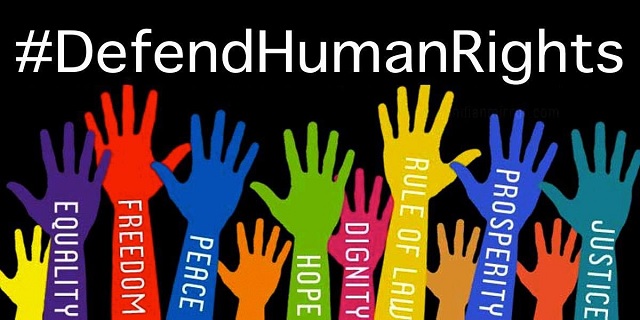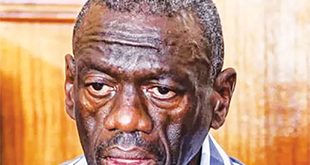
The discourse of Human Rights in the country overlooks the real political issues which perpetrate violations
COMMENT | NNANDA KIZITI SSERUWAGI | Young Ugandans usually define themselves as Human Rights activists when they become civically aware or come of political age. As a young lawyer and a recent graduate from the Law Development Center and Makerere Law School, I have many friends and colleagues working in the human rights field in the civil society industry. As a curious mind while growing up, I read about Human Rights as a good thing, as a matter of fact. It is one of those things we take up unquestioningly. Critiquing the Human Rights discourse in Uganda therefore feels like blasphemy. But since I’m an atheist, which offends the almighty God, I think I can render critical thoughts to the nontheist Human Rights religion too.
As I write this, several young people are held up in police cells and some are remanded to prisons for participating in the Anti-Corruption protest which happened on July 23, 2024, dubbed #March2Parliament. The stories carried in the life of every protestor are inspiring for every idealistic person, and emotionally compelling for anyone with a sense of empathy. Many young people shared their pictures on social media before the protest, announcing their resolve to die fighting against corruption, if that is what it would take to make a better country.
I have also read many articles agonising and ranting about the mishandling of the protest by security services, and pornographically appealing to the feelings of the reader, about the inhumanity of the government which abused the rights of young people rightfully exercising their civil liberties. Therefore, to contribute to this public debate, I will aim to question, analyse and explain, instead of adding to the rant.
Firstly, the Civil Society in Uganda – which champions Human Rights – is a complete misconstruction of the classical idea of the Civil Society born during Western Enlightenment. The idea behind Civil Society was to create a forum for people with common goals and interests to further develop democratic ideals, which in turn could lead to a more democratic state. In Uganda, Civil Society more or less means businesses registered by elites to attract Western funding, which often is lost in transactions than on practical projects they are intended to do.
By gift-wrapping for us what passes off as Civil Society, our Western partners deprive Uganda of the opportunity to nurture civically aware citizens, ruthlessly sculpted by political contestation over our country’s future, as happened in Western countries since the 18th century.
Secondly, the discourse of Human Rights in Uganda overlooks the real political issues which determine and perpetrate Human Rights violations. As such, Human Rights “activists” are preconditioned to sensationalise Human Rights abuses by identifying, exposing and prosecuting Human Rights abusers. The concentration is always on the easier thing to do – express ethical indignation. Most of Ugandan Human Rights defenders choose this peripheral path, which, with a single tweet, appeals to thousands of likes and emotional comments on Twitter/X, but also writes away the need for complex historical analysis and interrogation of Uganda’s challenges.
This approach aligns well with the interests of Western hegemony. The Right to Protect (R2P), which some scholars have recoined as the Right to Punish, is often invoked whenever the United States and its allies under NATO decide that it’s time to help Human Rights defenders in Africa with conclusively dealing with dictators who cannot be handled by the criminal justice systems of their countries. The humanitarian pretense under which these interventions happen folds up well with America’s military industry.
Thirdly, the Human Rights movement in Uganda subordinates the country’s political context by acting above instead of through it. From debates I’ve had with my “Human Rights Activist” friends, they don’t care or even reflect about the political-economy of governance in a peasant society that is Uganda. They speak over the country. They are abstracted from understanding Uganda in its multidimensional contexts by being pre-occupied with prescribing punishments for its corrupt politicians. However, democracies worldwide never enforce a fixed standard of rights. They observe rights consistent with their political context. Even the Bush government had to dilute the Bill of Rights in the interest of pursuing Homeland Security in the context of the War on Terror.
The problem to understand in the African context is that most of our states are young, brittle, suspicious and paranoid. Yet they constitute a modern, powerful world engulfing them. That’s why the Museveni administration is obsessed with labelling Human Rights activists as “Foreign Agents.”
In the end, for Ugandans to realise political progress and live in a country that observes our Human Rights, we shall need political reform. Political reform can only happen when the government and its people trust each other. This trust can only be born out of redefining ourselves. As citizens, we need to view politicians and public servants not as our corrupt political enemies. Rather, we should all understand each other as collective victims of bad politics inherited from our colonial legacy. Ugandan politics, by its nature, would compromise anyone, even a Saint. That realisation will enable us to pursue not superficial criminal accountability for the corrupt, but political reform for all.
*****

Nnanda Kizito Sseruwagi is a lawyer
 The Independent Uganda: You get the Truth we Pay the Price
The Independent Uganda: You get the Truth we Pay the Price



Kudos young lawyer Nnanda Kizito.
But your article is full of ambiguities as it doesn’t offer any specific practical solutions to Uganda’s political dilemma. Your article only joins the chorus of ruler’s condemnation of our former colonial masters who left us many decades ago, for their personal failures!
It’s therefore absurd that a young Ugandan lawyer who recently came out of the colonial university bequeathed to us by the very people you are coached to condemn can write such crap purportedly to critique his peers as a way of attracting the attention of rulers so they may becon him to join them!!
What are those peculiar Ugandan political contexts that demand us not to benchmark those from advanced democracies else where? For your own information every now and then Ugandan rulers are on the planes flying around the world especially to the Western capitals to benchmark in whatever field of humanity to come and try to replicate here!!!
I’m quite sure even you when that opportunity comes to fly to the Western capitals either to further your studies or benchmark human rights issues, I doubt if you will ever turn it down, instead should you discover that instead of you someone else’s name replaced yours you will curse evil corruption and Ugandan rulers.
So young lawyer your peers who work with Ugandan civil rights advocates groups should be applauded instead of trying to appear to condemn them!!